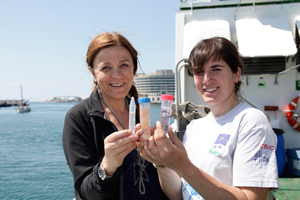Plastic debris and jellyfish swarms spotted in Mediterranean

04/06/2013
The sampling included aerosol collection, plankton tows and detailed water column and sediment samplings, in order to analyse natural and artificial radioactive isotopes and trace elements dissolved in the seawater, within the GEOTRACES project, represented in Spain by Jordi Garcia Orellana, a UAB lecturer. Four sea robots carrying miniature sensors were launched at different locations in the Mediterranean to continue collecting data (on water temperature, nutrients, salinity, chlorophyll, etc.) over the coming months.
Among the expedition's first findings, the researchers highlight the abundance of small pieces of plastic debris floating in the open sea. This is the first time a survey of this kind of debris has been conducted in the whole Mediterranean basin and the researchers were surprised to find so many microplastics a long way from the coast.
Another finding was that of large swarms of jellyfish in the open sea. This is the first expedition to have taken samples on a Mediterranean-wide scale. In the western basin the researchers found large numbers of the jellyfish Pelagia noctiluca (mauve stinger) and Velella velella (by-the-wind sailor, or purple sail). The data collected will help to determine the causes of these high densities and whether they could be anthropogenic in origin. There is currently much speculation on this question and, according to the literature, the most probable causes of the large numbers of jellyfish are the lack of predators, over-fishing and the rise in average sea temperature. Further research is necessary to confirm this, however, and this expedition is therefore highly important.
The MEDSEA European project
MedSeA, coordinated by the ICTA-UAB researcher Patrizia Ziveri, and co-funded by the 7th Framework Programme of the European Union and the Spanish Ministry of the Economy and Competitiveness (MINECO), is a project that aims to measure the chemical, climatic and biological changes taking place in the Mediterranean due to the increase in carbon dioxide (CO2) levels, and in particular the impact of acidification on sea organisms, and it will also study the socio-economic consequences of these changes. The research is interdisciplinary, involving chemists, biologists, ecologists and economists, who are providing new data and estimates on the responses of Mediterranean marine ecosystems to acidification, and are mapping the most vulnerable areas. Their findings will help to improve current oceanographic models and develop regional policies to mitigate the effects of the changes taking place.
Ocean acidification
Ocean acidification is a term used to describe the current decrease in the pH of the oceans, caused by CO2 emissions of human origin, for example from fossil fuel use and cement production. This is the first joint effort to study the impact of acidification and climate change on Mediterranean ecosystems, and it is crucial to the social and economic conditions of many millions of people who live on the coast or visit the region regularly.
In recent years the subject of ocean acidification has risen rapidly to the top of political, economic and social agendas and it is especially important to study it together with other pressures on the marine environment, like temperature, over-fishing, invading species and deoxygenation. The Mediterranean Sea is of special interest for the study of ocean acidification, since it is a complex, semi-enclosed sea with high environmental variability.
The oceanographic vessel Ángeles Alvarino
This oceanographic cruise took place on board the research vessel Ángeles Alvarino, of the Spanish Oceanographic Institute (IEO), in collaboration with the Marine Ecology Unit (UTM-CSIC), and was funded by FEDER. The Ángeles Alvarino's position can be tracked in real time on the sea traffic website by inserting the vessel's name. The cruise's outward leg was from Cadiz to Heraklion (Crete), beginning on 2 May, and the return leg was from Heraklion to Barcelona. The vessel left for Cadiz again this afternoon.
Photograph: The UAB lecturer and MEDSEA project coordinator, Patrizia Ziveri, on the left, with the ICM-CSIC researcher Melissa Acevedo, with samples of microplastics and jellyfish. (Photographer: Jordi Pareto).